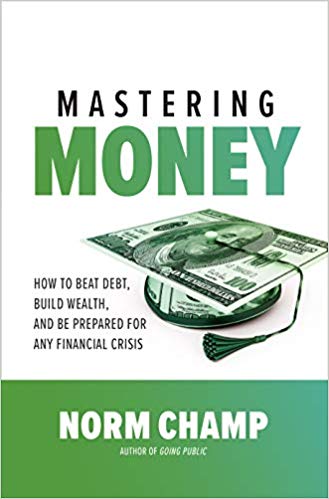Introduction Good Money is all about personal finance. This is a book that my wife was reading and I finished it before her. Authors Nathalie Spencer is a behavioural scientist. She leads an in-house team, is a published author, sits on advisory boards, contributes to industry events and publications. Contents Good Money has an introduction, a How to Use This Book section, 5 chapters, and an epilogue. The chapters are: 1. Money and Us 2. Money in the Day to Day 3. Resilience 4. Long-term Planning 5. Better with Money Each chapter contains 4 topics and comes with a toolkit and further learning. Review Good Money defines financial wellbeing as making ends meet day to day, planning for the long term and being prepared for inevitable hiccups along the way. How we spend our money reflects who we are, our expectations and our values. While having more and more money does not make us happier, having insufficient money can make us unhappy. Our point of reference changes when we get used to new circumstances. The new becomes normal. Humans think of the value of products not in absolute terms but in relation to other products, which might be exploited to…
Introduction How I Invest My Money is a personal finance book rather than an investment book. It is a collection of personal stories of financial experts. The editors hope that the readers could learn from this book and feel more confident in managing own money. I found this book being recommended in an investment blog and would like to see if my guess of their using mostly low-cost investment vehicles is true or not. Authors Joshua Brown is an American author, columnist, blogger (The Reformed Broker), commentator on CNBC, and CEO of New York City-based Ritholtz Wealth Management. He is also a contributing columnist to Yahoo! Finance, Business Insider, and serves on the board of advisors for Brightscope and Upside. Brian Portnoy is the founder of Shaping Wealth, a financial wellness platform. He has served as keynote speaker, seminar leader, and coach to thousands of investors on topics ranging from portfolio strategy to the connection between money and happiness. For more than 20 years, he has worked in the hedge fund and mutual fund industries as portfolio manager and educator. They are both editors and authors of their own chapter in this book. Contents How I Invest My Money consists of an introduction, 24 chapters, and a conclusion. Each chapter corresponds to a…
Introduction The Psychology of Money is about the soft skill of managing money. It aims to convince the readers that soft skills are more important than the technical side of money. I saw this book being recommended in an investment blog, so I was interested to know how it relates to investing. Author Morgan Housel is a partner at The Collaborative Fund and a former columnist at The Motley Fool and The Wall Street Journal. He is a two-time winner of the Best in Business Award from the Society of American Business Editors and Writers, winner of the New York Times Sidney Award, and a two-time finalist for the Gerald Loeb Award for Distinguished Business and Financial Journalism. Contents The Psychology of Money consists of an introduction, 20 chapters and a postscript (A Brief History of Why the U.S. Consumer Thinks the Way They Do). The chapters are 1) No One’s Crazy, 2) Luck & Risk, 3) Never Enough, 4) Confounding Compounding, 5) Getting Wealthy vs. Staying Wealthy , 6) Tails, You Win, 7) Freedom, 8) Man in the Car Paradox, 9) Wealth is What You Don’t See, 10) Save Money, 11) Reasonable > Rational, 12) Surprise!, 13) Room for…
Introduction Mastering Money is a book about personal finance. I am attracted by the subtitle, especially on how to be prepared for any financial crisis. This book is intended for US citizens, but some lessons can be applied in Malaysia too. The writer wants to help the readers to learn to get their finances in order and to invest in the future. Author Norm Champ is a lawyer by profession. He is currently a senior partner in the Investment Funds Group at Kirkland & Ellis LLP and a lecturer on investment management law at Harvard Law School. He was the former director of the Division of Investment Management at the US Securities and Exchange Commission (SEC). The author worked for Chilton Investment Company and Davis Polk & Wardwell before joining the public sector. He also has written another book, Going Public. Content Mastering Money has a total of 10 chapters. Chapter 1 serves as the introduction of the book. The remaining 9 chapters are divided into 3 parts. Every part begins with a short introduction before the main contents. The first part is Take Hold of the Spending Governor and it consists of 4 chapters. This part is talking about…
Introduction How to Manage Your Money When You Don’t Have Any is not a how to get rich book but a book about achieving financial stability. It is about doing the best with what you have. My book is the second edition of the book that the author wrote back in 2011. Author Erik Wecks is a full-time writer and blogger. He is an ordinary guy who had held several jobs before settling into current occupations. The author got into financial mire during the US recession and is sharing his tips on how to stay afloat when everything seems to be falling apart. Currently, he is focusing on fiction writing. Content How to Manage Your Money When You Don’t Have Any has 13 chapters. The author divides the book into 3 main sections. There are summaries within each section. Chapter 1 serves as the introduction. The first section deals with financial mission and consists of Chapter 2 and Chapter 3. The second section is regarding strategies to accomplish the mission. Chapter 4 to 9 make up this second section. The final section is about the tactics that can be used to accomplish financial goals and complete the mission. This section…





